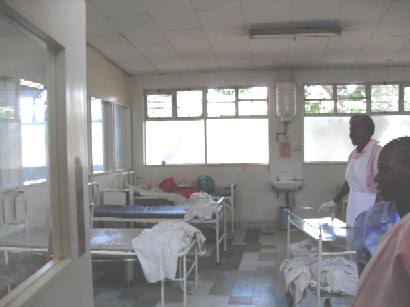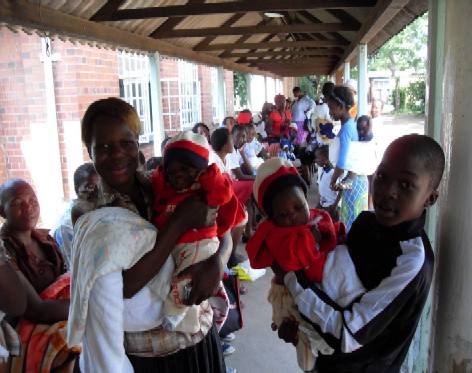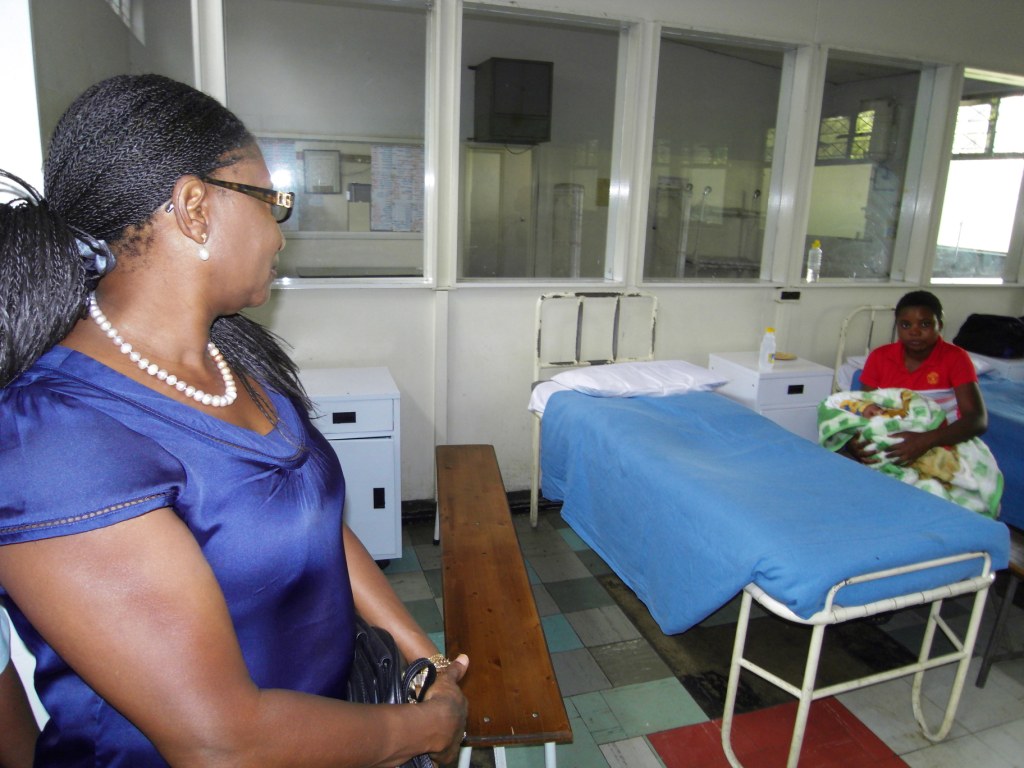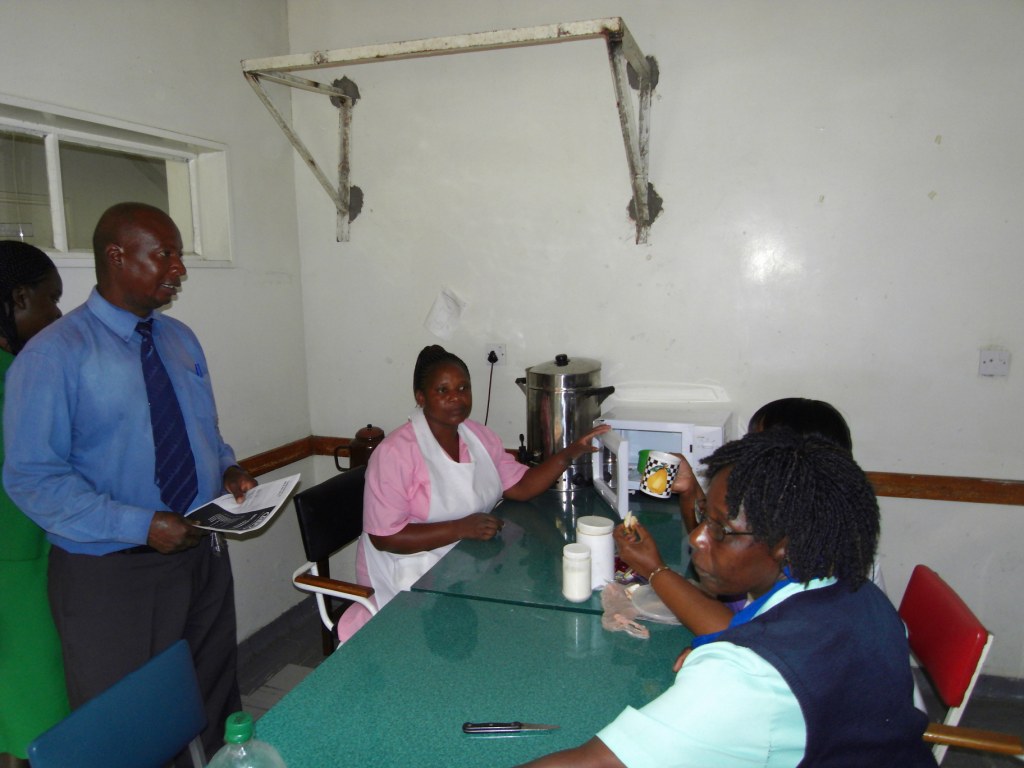| Mbare Polyclinic – Profile and request to ZimHealth | Mbare Polyclinic – Procurement list |
| Mbare Polyclinic – September 2009 Visit Report | Mbare Polyclinic – April 2010 Visit Report |
Mobilizing urgent support towards improving quality of and access to maternity and primary health care at Mbare Polyclinic, Harare, Zimbabwe
Overall objective
To reduce deaths and ill-health associated with pregnancy and childbirth that poorer communities are currently experiencing in Zimbabwe, by providing support to improve facilities and availability of urgently needed resources, initially at the largest Harare Municipal Primary Health Care facility, Mbare Polyclinic’s Edith Opperman Maternity unit.
Specific objectives
- To raise resources for purchasing and shipping essential pieces of equipment to help save lives of women during pregnancy or childbirth.
- To support or catalyse the purchase of essential drugs or medicines for use at Mbare Polyclinic.
- To support the rehabilitation of the delivery infrastructure at Edith Opperman, Mbare Polyclinic.
Background
Zimbabwe’s economic performance over the last decade or so has had negative consequences on the delivery of public health services throughout the country. The Edith Opperman Maternity hospital, like all other health-delivery facilities, has been functioning with poor or lack of essential equipment.
Although the government of Zimbabwe has made notable efforts to ensure the delivery of health services to its population, the prevailing harsh economic climate has rendered most the government initiatives inadequate.
On 30 July 2009, during the official hand over of medical equipment and other materials for the Edith Opperman Maternity hospital, donated by the Zimbabwe Network for Health (ZimHealth-Europe), in collaboration with Zimbabweans in the Diaspora based in the USA, the Minister of Health and Child Welfare, Dr. Henry Madzorera acknowledged that Edith Opperman Maternity hospital had been adversely affected by the harsh macro-economic conditions that plagued the whole country. He cited the challenges faced by the health system to include high staff attrition and turnover, low morale of the few health professionals who remained in the system, largely due to poor conditions of service, a dilapidated infrastructure due grossly diminished capital expenditure and the absence of planned maintenance. The Minister also pointed out that there were shortages of essential equipment and drugs as well as essential non medical supplies such as linen and protective clothing and transport.
ZimHealth selected the Edith Opperman Maternity hospital for its first project for a number of reasons, including the proximity of the hospital to the terminus for transport from within Greater Harare, the neighbouring suburbs and the rural areas. This makes the maternity unit a very busy centre delivering up to 400 babies a month with its bed capacity of 30! Its outpatient facility sees approximately 2,000 clients per month!
The other factor that swayed ZimHealth was the dedication of the staff that continued to work throughout the crisis and, reportedly, never went on strike during the recent periods of unrest and demonstrations by health-care providers in the country – the staff at this unit continued to work to save the lives of babies and mothers.
It was also important that there was unwavering support and commitment from the authorities in the city of Harare, including the Mayor of Harare and the Director of Medical Services in the city of Harare. This was clearly demonstrated by the presence of both at the hand over ceremony. Thus, assistance to the Edith Opperman Maternity hospital willl avail quality health services to a large number of poor urban and rural Zimbabweans who are some of the most affected by the crisis and ensure an immediate contribution to the continuation of access to maternity care in view of the presence of a dedicated team of health-care providers and the potential to resuscitate the hospital without needing extensive resource investment.
Mbare is a densely populated southern suburb of the capital city with an estimated population of 300,000. The Mbare Polyclinic is the primary public health-care facility available in this area, within which complex the Edith Opperman Maternity hospital is located.
Progress Report at Mbare Health Complex
Second consignment to the Edith Opperman Maternity Hospital
The Mbare Polyclinic in Harare received a second consignment of clinical and other commodities worth about US$ 14,775.00, making a total donation to Mbare Edith Opperman Maternity Hospital to date of over US$ 27,752. This second consignment, drawn from the outstanding items on the Mbare list, was funded through a donation from the City of Geneva, from whom a donation of 15, 000 Swiss francs was received by ZimHealth.
ZimHealth procured this second consignment, which was dispatched in November and delivered to the clinic in December 2009, through DAETA International Trading in South Africa.
Some of the items in the second consignment included a second newborn resuscitation unit, a hot water geyser, trolleys, patient screens, bed linen, patient gowns, a tea urn, and a microwave. Please visit the photo gallery on the website to view some of the items.
What difference has ZimHealth made at the Mbare Clinic?
In September 2009, four members of ZimHealth paid a courtesy call at the Mbare Edith Opperman Hospital to follow up on the donation of goods received in August 2009 and to assess further needs. The four were Francis and Maggie Ndowa, and Dan and Nancy Makuto (the latter are now based in Harare). A number of photographs were taken during this visit. Noted on this visit were the hospital beds which were looking pleasant and tidy compare with the visit in 2008.

(left) The ZimHealth visit in September 2009 and (right) Picture taken in December 2009 showing new bedside lockers
It was reported that currently there were between 25 and 30 bookings for antenatal care a day although this was expected to increase particularly as it costs US$ 50 for booking at Mbare compared with US$ 5,000 at the private hospitals in the city.
Encouragingly, it was also reported and observed that structural improvements were being made by the city authorities. For example, the ceiling in the waiting area of the Edith Opperman Hospital had been repaired by the City of Harare. UNICEF was obtaining quotations for repair of the roof and ceiling in the training room.
An assessment made at subsequent visits by Dr. Shiva Murugasampillay, Elizabeth Mason and Ms Lorraine Mangwiro in December 2009 highlighted the need for accelerating the renovation of the clinic buildings. It was understood that the city had allocated a budget to the purpose and that all the materials had been secured and the work was expected to start in 2010. The clinic required new furniture for staff and patients as current furniture is rather dilapidated.
It was reported also that this clinic had a regular supply of drugs from the International Committee of the Red Cross and National Pharmaceutical Company of Zimbabwe (NatPharm) with periodic support through the twinning arrangement with the City of Munich, Germany.
At the time that Lorraine visited the clinic in December 2009, it was noted that the bedside lockers for clients had been replaced with new ones. Although the lockers were not donated by ZimHealth, the leveraging provided by the initiative by ZimHealth to make the beds look uniformly pleasant cannot be discounted.
Staffing is still a major problem at the clinic. There are currently 5 nurses to share between Edith Opperman and the Polyclinic which meant that one nurse was left to deal with a booking clinic of 25-30 people a day, handling the administrative recording and conducting medical examinations, among other things. There were no doctors available for the clinics. A handful of doctors were donating time to see patients. Some doctors used their own equipment when none was available at the clinic. Specifically, in September 2009, the ZimHealth delegation was able to meet Dr Jenkins who volunteers his time to hold clinics at the Mbare polyclinic. His message was that he saw many patients with obvious clinical AIDS but who could not receive free ARVs as they were still waiting for screening for CD4 counts. He remarked that some patients would be dead before they got round to having a CD4 count. He expressed frustration that this seemed to be a WHO recommendation, which in his opinion, bore little resemblance to realities on the ground.


The clinic currently had at the time of the visit 1,534 registered HIV patients. The HIV clinic was currently seeing up to100 patients a day with only one nurse attending to them. The process involves extensive record keeping, issuing medication and providing counselling.
The amenities for staff had also improved. During one of the visits staff could be seen enjoying a hot cup of tea – the tea urn and microwave donated by ZimHealth being put to good use.
During the September 2009 visit, ZimHealth members were shown around the clinic the grounds which were being well kept, particularly the bushes which were being trimmed with the hedge cutters donated by ZimHealth. It was noted that whilst this was not a “medical” instrument, it helped to improve the aesthetics of the clinic. The gardener indicated that he would also appreciate a hosepipe!
There is no doubt that the efforts made by ZimHealth during 2009 have made a difference at the Edith Opperman Maternity Hospital. There have been improvements in the appearance of the maternity wards, the amenities for staff and, minor but useful and much appreciated, equipment for tendering the gardens. In addition, the effort by ZimHealth are complementing efforts by other benefactors and, it would seem, are acting as leverage for structural improvements being made by the city authorities. A quick tour of the changes in pictures is given below.

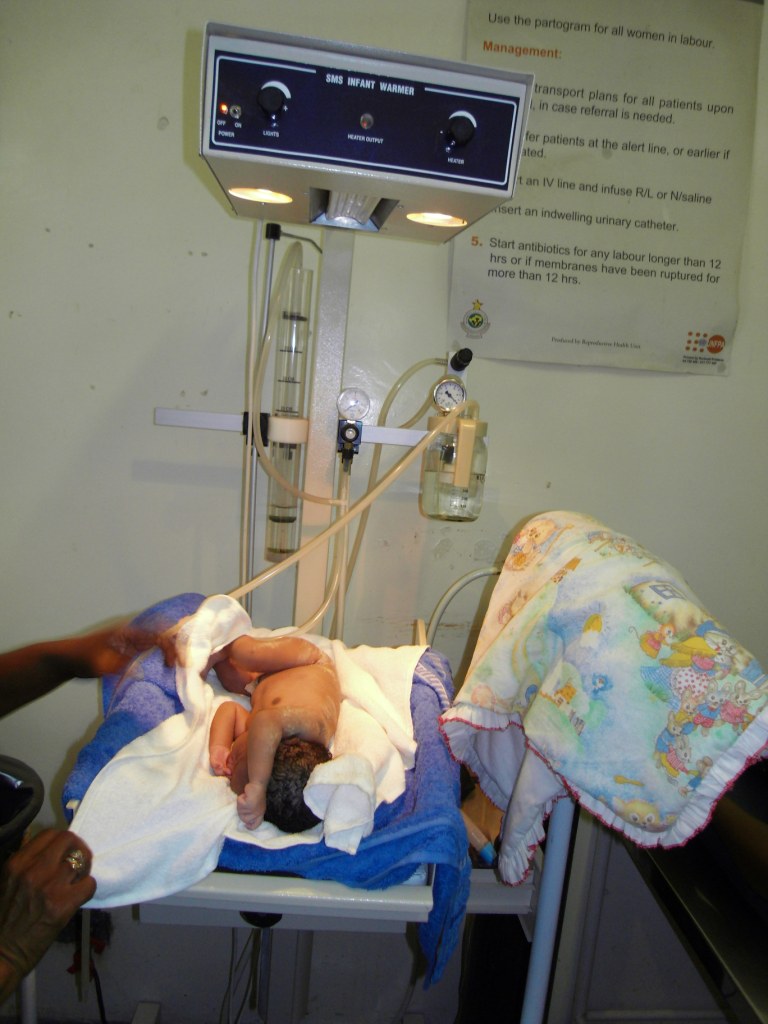
(left) The outdated baby resuscitation unit – January 2008 and (right) The new baby resuscitaire in use – January 2010


January 2008
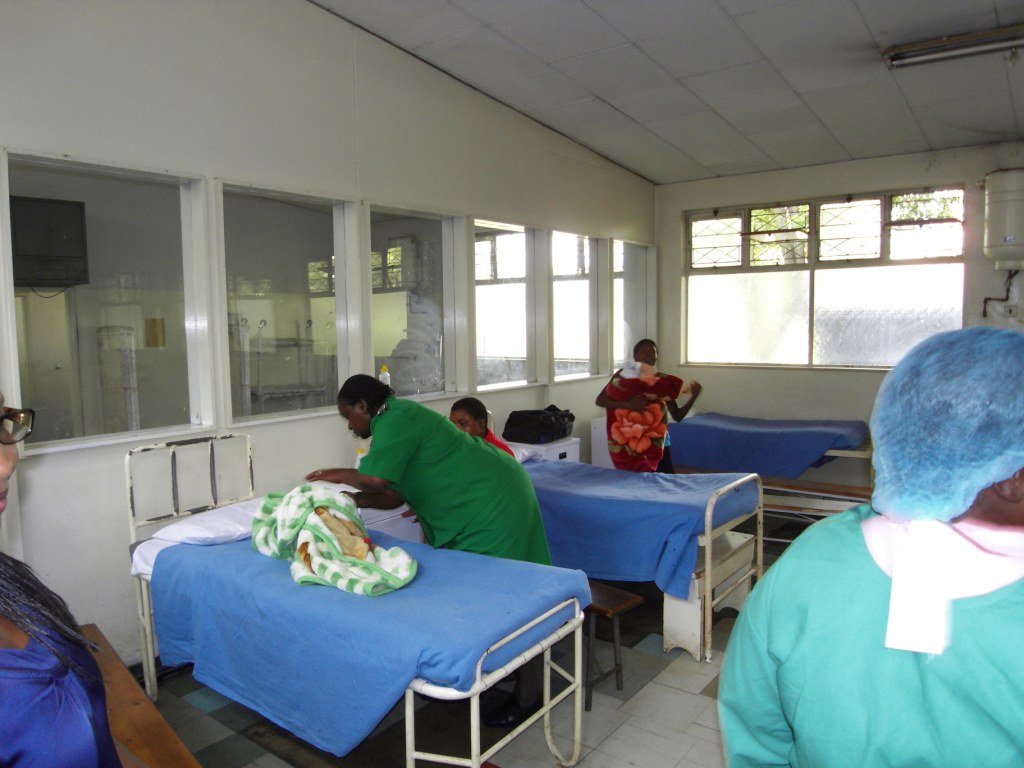
(left) September 2009 and (right) December 2009
ZimHealth appeals to all Zimbabweans in Europe, the USA, Africa and elsewhere to rally behind the cause and help revamp the health system in Zimbabwe. All proceeds donated to ZimHealth go towards the procurement of clinical and other materials for clinics and hospitals in Zimbabwe.
The full list of items procured for this project can be viewed here
Take a tour of the images in the ZimHealth photo gallery to see the changes that have been made to the Edith Opperman Maternity Hospital.



